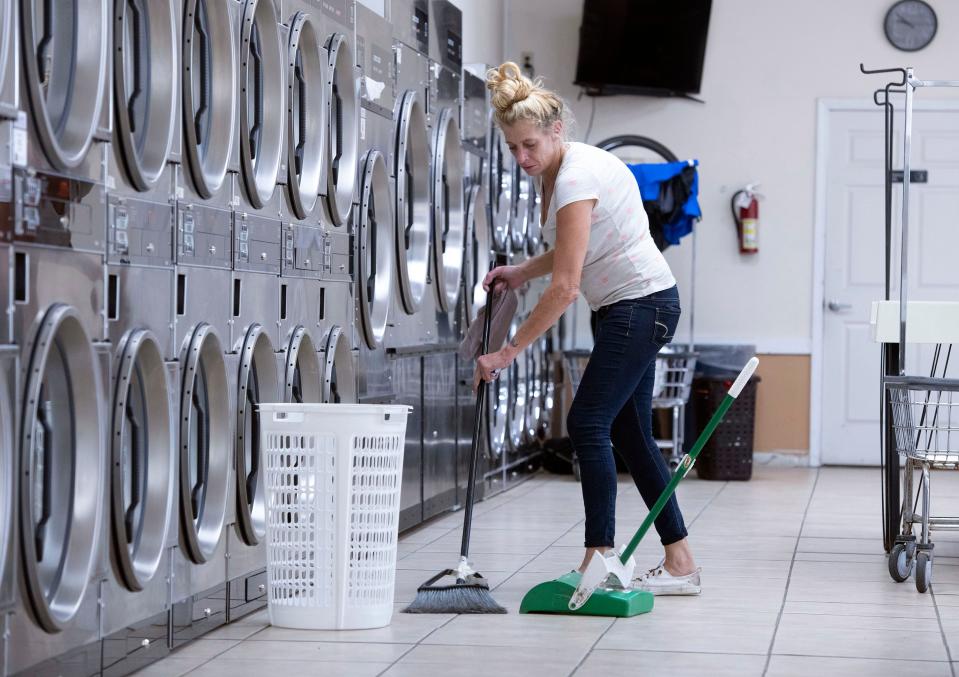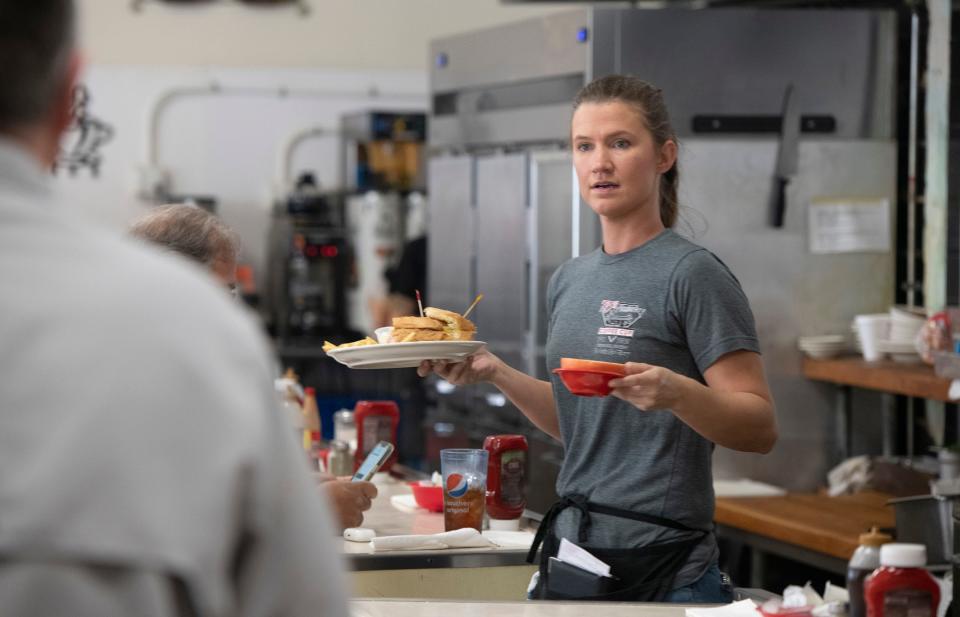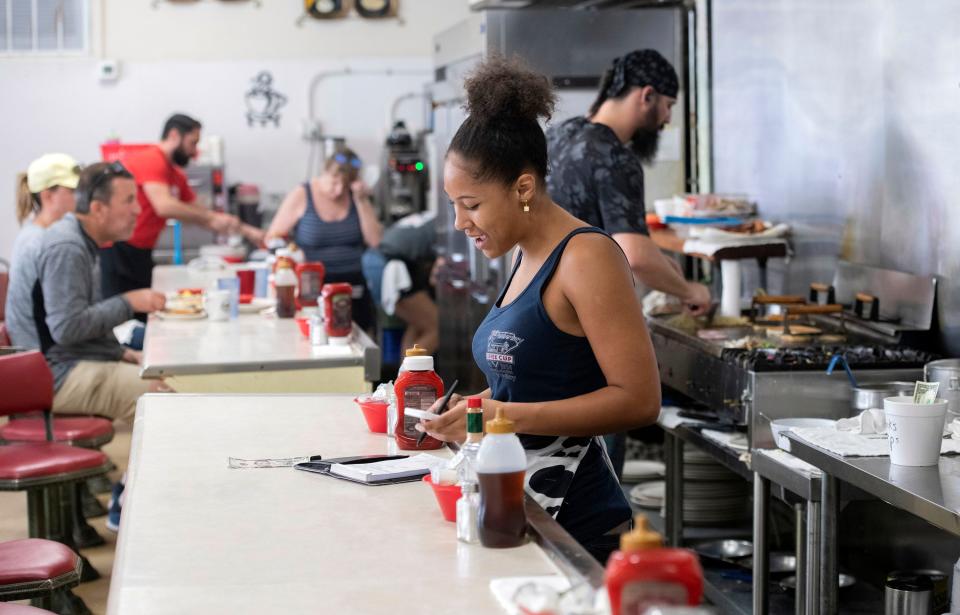One-two punch of inflation, minimum wage hike could put Pensacola businesses on the ropes
As the minimum wage in Florida climbed another dollar to $11 starting Friday, Pensacola business owners are concerned about the one-two punch of rising labor costs and surging inflation.
Regardless of differing opinions on what the solution is — whether it be to raise prices, reduce staff or find ways to become more efficient — local business owners are on the same page that they need to offer a lot more than just minimum wage to retain the employees they currently have.
"We have a big problem and we almost turned a blind eye to it," said Nathan Holler, owner of downtown Pensacola's Doghouse Deli. "As entrepreneurs, I think we failed at getting ahead of the system in paying our employees a livable wage."
The pandemic changed the bare minimum of employee pay
Following the exodus of service industry employees during the peak of the pandemic in 2020, Collier Merrill, president of Pensacola's Great Southern Restaurants, struggled with the idea of offering substantial sign-on bonuses to attract employees that were just coming in. Instead, he opted to reward those who stayed the course.
A $250 bonus to say "thanks for being here" may not seem like much to the individual, but for a company with about 400 employees on the payroll, it adds up.

The affordable housing crisis: Renters across Northwest Florida struggle to find affordable housing. Is there a solution?
Pensacola's new Mayor-elect D.C. Reeves: Pensacola Mayor-elect D.C. Reeves' transition team goes to work on guiding document
These kinds of incentives are not uncommon as businesses fight to keep employees and keep their doors open for service.
Mark Taylor, owner of East Hill Laundry, said that in pre-COVID times, the $10 an hour entry range used to be sufficient for his workers, spanning from laundry room attendants to those physically washing clothes for customers. But now, he said an $11 per hour salary wouldn't bring in anything but a skeleton crew.
When recently reevaluating his employee wages as the deadline for the increase inches closer, Taylor discovered only one of employees, a part-time cleaner, was being paid below the new minimum wage threshold.
As people returned to the laundromat after COVID, he found the asking price had grown higher, even in the laundry business, which ranked in 2019 as the lowest paying job in America.
In order for those who left the service industry during the pandemic to come back, the price has to be right.
The 'wage war' for employees between local businesses
Bill Garner, a rapid response coordinator for CareerSource Escarosa, refers to this current state as a "wage war" where businesses are in constant competition with their neighbors for employees.
When jobseekers would file into his Ninth Avenue office a few years back, there would be about five jobs across Escambia and Santa Rosa counties that an applicant would be eligible for.
Now, instead of just helping his clients identify where the jobs are, he also helps them interview for all of them, filter through their options and select one that has the best pay, best benefits and most comfortable environment to meet their personal needs and lifestyle.
Garner has also been consulting businesses to help financially prepare for the changes of paying employees more, encouraging them to look to ahead to the eventual $15 increase versus handling it one year at a time. When asking business owners for their five-year strategic plan, he gets a deer in the headlights reaction all too often.
He said it is time to start taking a hard look at where money can be saved to pay employee salaries into the future.

With growth in Santa Rosa county's industrial parks, a forthcoming Amazon distribution facility, Pensacola airport expansion and the post-pandemic birth of restaurant and retail entrepreneurs, there is no shortage of opportunities for the unemployed, Garner said.
It's becoming incumbent on businesses to sell themselves to their employees and prove that they have something more to offer than just a tempting starting salary.
Industries all over Pensacola are facing this issue, like Director Fred Crenshaw's team in Pensacola's sanitation department.
Just this month, the Pensacola City Council approved a 14.6% garbage collection fee increase, partly due to increasing employee salaries. Until that pay raise took effect, Crenshaw struggled to find the staff he needed to make the necessary routes, leaving his team with 20 to 30 hours of overtime per each individual worker.
Since the wages were increased, that number has dwindled down to about two hours a person and he now has a full staff on board of 13.
Though he still would hesitate to consider the salary "livable," he would say it is an introductory wage for those looking to advance in the career path. His staff has the opportunity to go on to make $25 an hour through years of accumulated experience and promotion.
"It's competitive. I can say that, it's competitive," Crenshaw said of the wage increase. "(But) it is just a starting point."
For his staff, some of whom are living paycheck to paycheck, every extra dollar makes a difference in their ability to provide for their families.
Financial ramifications of the increase
For restaurant workers who hit the minimum wage mark at small-town diners like Jonathan Coffey's Coffee Cup Restaurant, tips are his staff's lifeblood.
Restaurants like Coffey's, that pride themselves for the simplicity of their breakfast menu and nostalgic environment, fear raising prices too high that even the most loyal customers will resist paying.

The demand to increase the minimum wage seemed positive on paper, but figuring out where the money would come is difficult as food costs continue to soar, according to Coffey. Along with the minimum wage increase, tipped employees will be required to start at $6.98 an hour.
With a minimalist menu, labor continually remains his highest expense. Increasing the labor costs $1 every year with other expenses on the rise feels unsustainable, he said.
"For $15 a breakfast, that's hard to justify for me as an old-school, hole-in-the-wall restaurant ... there's only so much you can charge for bacon and eggs."
And even the city's most longstanding establishments are not exempt from the looming financial difficulty to come.
Shifting a focus on work culture
Holler, of Doghouse Deli, said it comes down to more than a salary bump, but a cultural shift in the way a business is run to keep employees from searching for greener grass.
Across industries, employees need to feel like they are a part of something bigger than themselves to justify staying at a job, he said.
Because of this, Holler embarked on a journey to "honor" all of his employees by implementing a system where a customer's monetary tip is a tip to the experience, rather than a tip to the individual server.
It's a tip saying that the food and cocktails were tasty, the dining room was clean, the staff were friendly, and the server was attentive.
This takes shape as one, big tip-sharing pool that is divided amongst employees.
In the two years he has worked on tweaking the tip share system, he has found a way to ensure all employees take home about $15 above minimum wage every night, regardless of front of house or back of house status.
Not only does the system meet financial mandates by the state, but it also creates a more cohesive team of staff that helps with employee retention in a trying time in the service industry.
"It does create this synergy and honors every individual person," he said of the shared tip pool. "It ensures every person is seen, valued and heard."
So far, Holler said he has seen it has drawn the existing team closer, and "weeded out" the staff that would rather go out on their own and make more money elsewhere.
Even though Holler's system seems to be working, the state's mandate intended to help employees has become a roadblock. Since all of his employees are technically earning significantly more than minimum wage, he questions whether or not he will still have to comply with the $1 increase. He has even sought legal consultation.
When operating under a small profit margin for a small business like his, the extra dollar per employee is enough to land a business owner in the red.
if business owners can't pay employees properly and support them in providing for their families, many workers will leave the industry altogether, he said, which is a big problem for the hospitality industry.
"It's a double-edged sword and we're just getting our (butts) kicked right now," Holler said.
This article originally appeared on Pensacola News Journal: Florida minimum wage increase may spell trouble for Pensacola jobs
